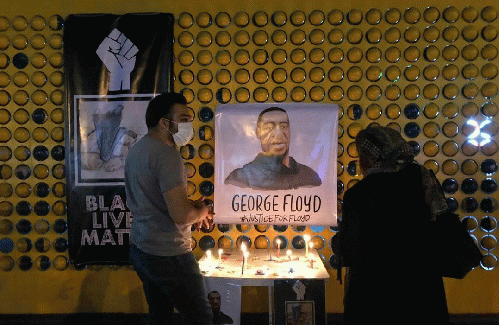Republished from American Herald Tribune

Iranians hold a vigil in for George Floyd in Mashhad, Iran, May 30, 2020
(Image by American Herald Tribune website) Details DMCA
The summer of 2020 is likely to be characterized not only by the persistence of a global pandemic but also by the ferocity with which people in the United States march against racist policing. George Floyd, Breonna Taylor, and the countless number of Black Americans killed by the police have inspired a resurgence in the Black Lives Matter movement. Regular protests have forced local, state, and federal officials to offer inadequate reforms. The corporate media has been forced to pander to a subject, racism, which it would much rather ignore or manipulate for profit. Scant attention has been paid, however, to the international solidarity that the movement has received from nations around the world. Cuba joined African nations in urging the UN Human Rights Council to act on the problem of police brutality and racism in the wake of George Floyd's murder in Minneapolis. In the early days of the unrest, Iran and China's foreign ministries offered statements highlighting the U.S.' hypocritical stance on human rights and its continued policy of discrimination toward Black Americans.
The same forces enabling killer cops to terrorize Black communities across the U.S. have condemned international reactions from nations such as Iran and China as "interference." Former National Security Advisor under Barack Obama, Susan Rice, declared international commentary on U.S. race relations as a cynical plot by Russians to exploit divisions in the United States. Indeed, for the past four years, neoliberal and neoconservative political functionaries have repeated Cold War era tropes to both deflect attention away from the essential character of the U.S. social order and to discourage international solidarity against imperialism. China, Iran, Russia, and any nation that the U.S. sees as an "adversary" have been vilified as enemies of U.S.-based social movements by the very same forces creating the conditions for their rise.
The latest uprising against racist policing in the United States presents an opportunity to forward a vision of peace in a period defined by war. A system of policing designed to protect the privileged and powerful has created its own kind of war in working class, predominantly Black neighborhoods across the United States. The uprising against the wanton murder of Black Americans by the police has come in a period where the U.S.' so-called monopoly on global dominance is waning. Peace is not merely the absence of war; it is also presence of justice. The U.S. has been exposed as incapable of providing any semblance of justice for majorities of people at home and abroad.
The past three months have been a crash course in the bankruptcy of the United States' racist and capitalist system. In March, Bernie Sanders was crushed by the DNC only for the so-called "democratic socialist" to bend the knee to his executioners for the second straight election. The COVID-19, which spread undetected during the Sanders debacle, would go onto kill over one hundred thousand people and engineer a capitalist crisis of many magnitudes greater than the 2008 collapse. George Floyd's Memorial Day assassination by Minneapolis police in many ways ignited a fire that had been brewing for many months. Despite these structural ailments, the U.S. managed to spend the Spring season imposing new sanctions on Iran and Syria, escalating a new Cold War against China, and attempting the overthrow of the Venezuelan government.
U.S. militarism, like racist policing, never rests because the system of imperialism requires endless war to protect the privileges and profits of the real looters: the capitalist class and its hirelings in all spheres of society. Yet at no other moment in history has the U.S. empire been more afflicted by domestic and international disturbances. Economic crisis, mass protest, and the mass graves produced by the COVID-19 pandemic has delegitimized the leadership of the U.S. imperial order. These conditions have exposed the great deal of suffering afflicting masses of people in the form of unemployment, premature death, and racist police brutality. Such suffering, however, has also presented a host of opportunities to develop a new vision for U.S. society in ways that the dead-end of electoral politics never could.
No movement to end the suffering imposed by capitalist economic crises, pandemics, or killer cops can get far without international solidarity. That is what George Floyd's family realized when it took the issue of policing to the UN Human Rights Council. However, the NGOs that helped the families of slain Black Americans are not equipped to place pressure on the United States within the international arena. These institutions will support reform, but only if their major donors are protected. International solidarity is most effective when it involves nations and/or movements of people coming together to fight for a common cause, with everyone involved providing mutual aid in their struggles for liberation.
The U.S. has not seen such a movement in over two generations. There is no better time than now to begin laying the basis for international solidarity to pressure the U.S. government to negotiate with protestors calling for an end to police homicide of Black Americans. Currently, over 30 nations are crippled starvation sanctions imposed by the U.S. and its allies. China, Russia, Iran, Syria, Cuba, Venezuela, and dozens of nations across Latin America, Asia, and Africa have every interest in curbing the ongoing state of perpetual warfare led by the United States. Perpetual warfare around the world includes not only U.S.-led sanctions but also drone assassinations, unilateral invasions, and proxy wars. On the domestic front, militarized police departments receive millions each year in direct transfers of military gear and regularly train in allied imperialist nations such as Israel. The purpose of militarization at home and abroad are the same: to create conditions of terror, fear, and social control necessary to maintain the status quo of U.S. corporate and imperial hegemony.
Another key ingredient to international solidarity is the existence of an alternative to the hegemonic system of power. In the 20th century, the struggle between capitalism and socialism split the world into contending camps of development. Significant leaders of the Black liberation movement expressed solidarity with the Soviet Union, China, and other socialist movements facing military aggression from the United States. The Black Panther Party, for example, offered members of its organization to the National Liberation of South Vietnam in 1970 in recognition of the common enemy it shared with the Vietnamese. Less than two decades prior, Black revolutionary leaders such as Paul Robeson and W.E.B. Du Bois spoke highly of their experiences in China and the Soviet Union in the hopes that the struggle for peace and the struggle for Black liberation would join as one to bring the U.S.' racist and capitalist order to its knees.
That did not happen. It could be argued that the lack of unifying global ideology coupled with the U.S.' massive military, economic, and political influence in world affairs makes the possibility of nations directly supporting the struggle for Black lives at this moment remote. But a sea change is occurring globally and a new leader on the world stage has emerged: China. The COVID-19 pandemic made clear that China is not only an economic superpower, but also a political one. China's critical solidarity in the fight against the pandemic has only strengthened its leadership on the global stage. China is leading a new camp that rejects the U.S.-led order of austerity, unilateral dominance, and endless war. Not only has China vastly reduced poverty within its own country and lit a way forward in addressing global pandemics, but it has also shown a commitment to standing with beleaguered nations such as Iran and Venezuela struggling to survive amid U.S. sanctions.
It is critical, then, for activists to reject the hostility being thrown at China and its allies in the Global South for merely commenting on the murder of Black Americans by the police. Susan Rice must not be allowed to blame Russia for U.S. unrest around racism. Secretary of State Mike Pompeo must not succeed in his efforts to condemn Cuba, Venezuela, and China for taking prominent roles at the UN Human Rights Council. Pompeo and Rice want to isolate the struggle against racism in the United States. Only concrete expressions of solidarity with nations around the world can thwart their efforts and create the conditions necessary for lasting social transformation.
Black revolutionary and leader of the Monroe Chapter of the NAACP Robert Williams explained international solidarity concretely in his response to the national NAACP's criticism of his relationship with Cuba amid the struggle against Jim Crow sixty-plus years ago:
It is foolhardy for an oppressed Afro-American to take the attitude that we should keep this life and death struggle a family affair. We are the oppressed, it is only natural for us to air our grievances at home and abroad. This race fight here in America is no more a fight just for Americans than is the fight for black liberation to be conducted by colored only. Any struggle for freedom in the world today affects the stability of the whole society of man. Why would you make our struggle an exception?
The time has come to build a new internationalism in the United States that builds upon the rapid progress made in just a matter of a month around the struggle against racism. If the struggle remains homebound, it runs of the risk of being smothered by a national security state more interested in a "diverse" imperialist order predicated upon the misery of Black and brown peoples the world over than the enactment of justice for those terrorized by the U.S. police state.





